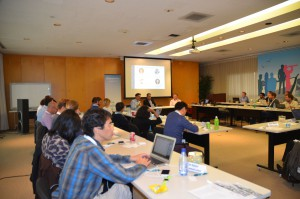Analytics Forum: AI in Telecom
Telecom Council meets monthly for lunch with dozens of telcos, vendors, startups and VCs. This month we will meet for lunch to examine how AI can be applied to the massive operations of telcos, and improve the bottom line.
- Date:10/28/2016 12:00 PM
- Location DoCoMo Innovation, Palo Alto CA (Map)
Description
Agenda, Attendee List and Presentations are available to members in the PRESENTATION LIBRARY
Silicon Valley, California, Oct 31 2021/Meeting Recap/ Council members and guests discussed AI as it applies to the telecom industry at DoCoMo’s offices.
 Artificial General Intelligence is what you see most often in science fiction films, like Ex Machina, with robots that are generally skilled and capable of a wide range of intelligent action, much like a human. More realistic in the current time frame is Narrow AI, where the AI is far from as capable as a human, but on a narrowly specified task, the AI can perform as well as, or better than a human.
Artificial General Intelligence is what you see most often in science fiction films, like Ex Machina, with robots that are generally skilled and capable of a wide range of intelligent action, much like a human. More realistic in the current time frame is Narrow AI, where the AI is far from as capable as a human, but on a narrowly specified task, the AI can perform as well as, or better than a human.
What distinguishes Narrow AI from previous “expert systems” is that the AI is capable of Machine Learning, and can iteratively improve itself towards the human-stated goal. In Expert Systems, the intuition must come all from the human, and the machine blindly follows the decision tree the human programmed, albeit very fast. In AI, the system will discover its own patterns in the data, will extract its own learning, and may even execute its own A/B testing. If a human defines a metric as a goal, the AI will deliver refinements toward the goal.
In telecoms, AI is primarily seeing use in:
- Fraud detection
- Call center support systems
- Chat bots for direct customer support
- Real time pricing and offers
- Churn pre-detection and reduction
- Network performance and outage prevention (SDN)
One of the key take-aways from panelists Padraig Stapleton, VP Engineering at Argyle Data (@ArgyleData), and Patrick Ehlen, Chief Scientist at Loop AI Labs (@LoopAILabs), was that Narrow AI feeds on data. It needs data to become intelligent, to use for regression analysis and test runs. Telecom is an industry rich in data, and is in a unique position to feed the AI process. Unlike self-driving, where Uber, Tesla, Google, and others need to collect immense amounts of data to make their systems work, telecom ALREADY has this data, and just needs to point the AI at the haystack and set the objective as “needles”.
In case you missed it, photos and attendee list are available in the Member Library.
AI x Big Problems = Big Results
This panel will talk how AI can be applied to the massive operations of telcos, and improve the bottom line.
Moderator: Derek Kerton, Managing Partner at The Kerton Group
- Shohei Hido, Chief Research Officer at Preferred Networks
- Padraig Stapleton, VP Engineering at Argyle Data
- Patrick Ehlen, Chief Scientist at Loop AI Labs
- Amanda Kahlow, Founder & CEO at 6sense
Google purchased AI startup Deepmind for $500 million in 2014, against competing bids from the likes of Facebook and others. What did these deep-pocketed companies know, and why did they want to pay top-dollar for strong AI technology? Well, today we know at least one of the reasons: Through the use of sensors around Google’s datacenters, and cooling controls, Deepmind has delivered energy savings of “several percentage points”. If that doesn’t sound like much, consider that Google used over 4,402 GWh in datacenters in 2014. Great Scott, Marty!
The benefits occur because Google could apply focused AI on a specific problem, but a problem with massive scale. In this case, a few points yields millions. Network Operators also work on similar scales, with huge:
- Billing databases
- Physical Networks (with virtual components)
- Datacenters
- Data packets in flow
- Numbers of subscribers
Our Roundtable will discuss AI, and solutions that can have a measurable impact across a broad enough telco system to really matter.
ABOUT ROUNDTABLE MEETINGS
Telecom Council Roundtable Meetings collect 50+ decision makers monthly to examine and discuss advances, needs, technologies, trends, and policies that are affecting their businesses. In addition to an audience-driven discussion, these Roundtables provide ample networking time for the experts in the room, and often several demos of new technologies or startup companies.
Agenda, Attendee List and Presentations are available to members in the PRESENTATION LIBRARY